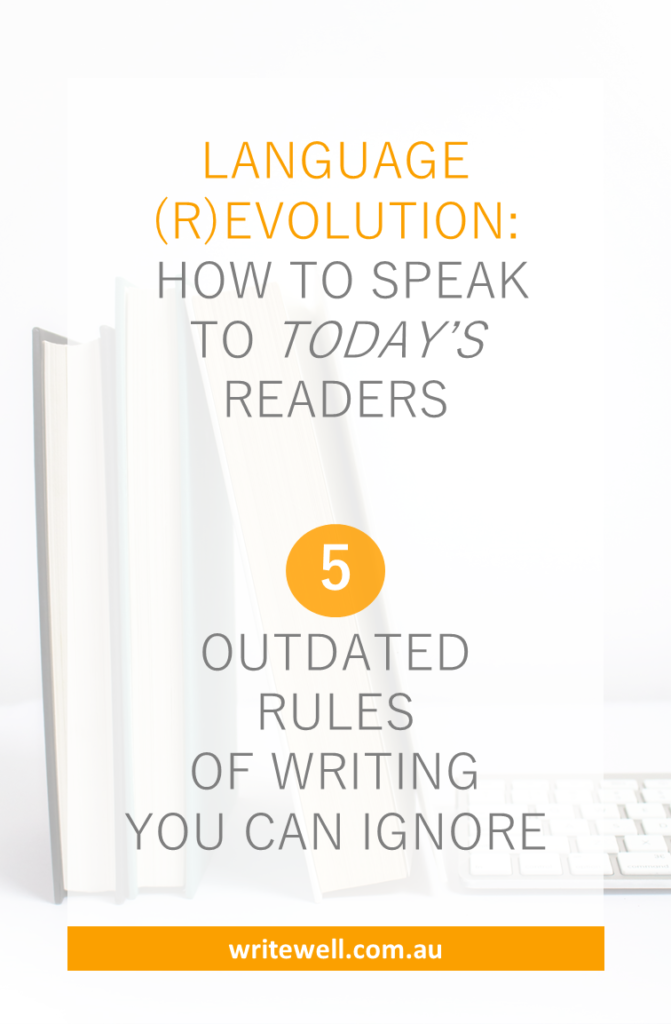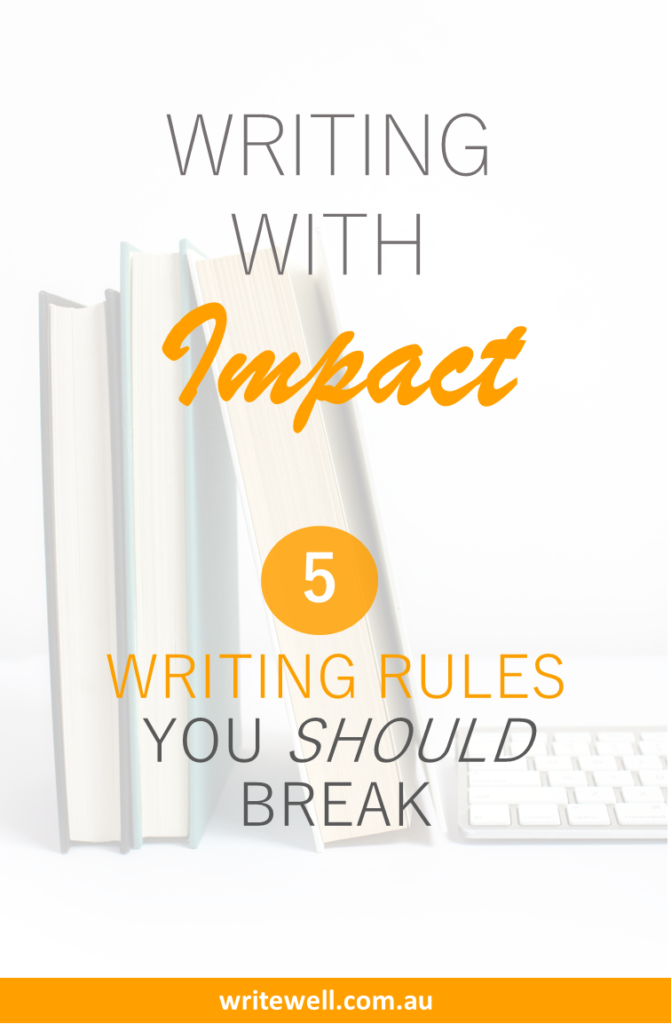5 writing rules you can break.
There are rules of writing and there are rules.
Fear of sending or publishing a piece of communication riddled with ‘errors’ can stifle your creativity and affect productivity.
So let’s clear up some of the ‘rules’ you can ignore – without getting bogged down in grammar theory (because you don’t need to be a grammar expert to be a great writer).
Language has globalised and is evolving at a pace unlike any other time thanks to technology. This means we can now avoid awkward, overly formal language and favour a style that appeals to our audience, is easy to read and achieves your writing goal – without offending the grammar police.
Of course, if you’re writing an academic essay, a report to send up the chain, or a letter or email that requires an element of formality, you might like to stick to the rules.
If it’s a blog, web content, marketing copy – anything that needs to persuade or sell, those rules are made to be broken – as long as you know the rules you’re breaking, your writing suits your audience, and it’s easy to read.

1. Start a sentence with And, But, Because…
“Never start your sentence with a conjunction,” you were lectured at school.
Words such as and, but and because are still used to link elements within a sentence. But sometimes they also have a nice ring at the start of a sentence. And they can grab your reader’s attention – make an impact.
So if it sounds right, and it suits your style of writing – for your intended audience – start a sentence with a conjunction. See how it feels.
Do you write too many words?
Cut the clutter with this cheat sheet.
2. End with With, To, About…
“The sort of English up with which I will not put.”
How would you write it?
A famous line widely attributed (probably incorrectly) to Winston Churchill. Regardless of the source, it remains a great example of just how stuffy and convoluted a simple sentence can become to avoid a ‘dangling preposition’ (think: with, to, about, from, in, of).
If it’s difficult to read or sounds clumsy, it’s best to ditch the rule or rework the sentence. This way, your readers won’t jump to the conclusion your writing is average… or that you’re a snob.
3. Use incomplete (or one-word) sentences and paragraphs
Subject-verb-noun-adjective-verb: a sentence should contain all this and more.
Not anymore. If you’re looking to make an impact – particularly with a younger audience – one word is sometimes all it takes.
In an age where time is of the essence and multi-tasking rules, you need writing tactics up your sleeve that will cut through the noise and grab your reader’s attention.
And if a one-word sentence – or paragraph – is it, go for it. Who’s got time to read (or write) anyway?
4. Make it personal
You’ve probably also been told not to use the word I when you write. Perhaps it isn’t appropriate for an essay or a formal report, but if it’s a blog post, an email, a case study, I will help you tell your story. And stories are a powerful way to get a message across – and build a relationship with your reader.
Throw in you as well, and you not only make it personal, you turn it into a conversation.
Write with more confidence with 3 simple tricks.
WATCH NOW!
5. Use They, Their, Them in the singular
Let’s start with an example: You want your reader to read right to the end. But you also want them to follow through with whatever you’re asking them to do.
In the past, you might have written him instead of them. Of course, this doesn’t happen these days. And him or her is too long-winded, so we need another option.
Although technically incorrect, they, their, them is our best alternative. The odd nit-picker might kick up a stink, but in everyday communication, this is now acceptable.
So write for your reader. Write so it’s easy for them to understand and follow your call-to-action.
Extras – for the sticklers
Here are a couple of rules that still bug me when they’re broken – they’re now widely accepted in the world of written communication so I need to breathe in and let it go. What annoys you when you see something written incorrectly? Let us know in the comments, below.
- Numbers: Write one to nine in full; 10 and beyond as numerals – except in special circumstances such as headlines. These days, it’s also okay to use numerals for emphasis… and pretty much any other situation. The same goes for per cent and its symbol %.
- More than v over: Ever since it was drummed in to me as a cadet journalist, I’ve cringed when I see over used instead of more than. The rule? When followed by a number, use more than. Over is a physical reference – the cow jumped over the moon.Example: The fundraising appeal raised more than $200,000.They have completely different meanings – but that doesn’t matter so much anymore, especially if you want to make an impact by writing fewer words.
(It should be noted, I often revert to the rule for these two when editing my clients’ copy.)
What do you think? Which writing rules do you break? And which rules do you hate to see broken? Leave a comment below!
Want to produce better writing?
Join the WriteWell community and receive valuable resources that will improve your writing, including tips, cheat sheets and more. Here’s a taster:
- Write less, say more: Make more impact by writing fewer words
- Write with purpose: 5 ways to strategically target your reader
- Captivate your readers: How to write compelling content
- The power of simplicity: How to keep even the most complex writing task simple
Receive more writing tips – free into your inbox. Join here!
Share the love
Like this writing tip? Share it with your friends and colleagues.


